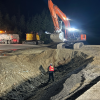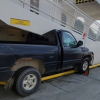First Nations in northern British Columbia have secured a one-year pause on new mining claims across a vast stretch of their traditional territory, a move Indigenous leaders called “history-making” for Indigenous-led land management.
Gillian Staveley, a member of Kaska Dene and director of culture and land stewardship for the Dena Kayeh Institute, said the agreement marks a big step forward.
“This is a really important beginning,” Staveley said. “We’re really focusing on the work that’s moving us forward toward what we’re striving for, where Kaska leadership is respected and reconciliation is honestly more than just a word.”
(7).jpg)
The BC government announced Tuesday that for the next year, no new mining claims can be staked or registered in one-third of the region covered by the agreement.
The pause will give the five First Nations, including the Tahltan, Taku River Tlingit, Kaska Dena, Gitanyow and Nisga’a Nations, and the province time to work together on a land use plan across 16 million hectares and gather input on how the land should be protected, used and managed in future.
Sensitive ecosystems, rivers, lakes and wildlife habitats in the area will be protected from new industrial disturbance while the pause is in effect.
Salmon spawning streams, old growth forests and areas important for caribou and moose will not face new mining impacts.
Areas of cultural and spiritual significance to the Kaska — burial grounds, traditional hunting and gathering areas and sacred sites — will be protected from new mining while their importance is documented and considered in planning.
Zones for different uses — such as protected areas, sustainable forestry, tourism, or potential future mining — will be mapped out.
At the heart of the agreement is Dene Kʼéh Kusān, a vast wild area in northern British Columbia. In the Kaska Dena language, the name means “Always Will Be There.”
The region is one of the largest intact natural landscapes in the province, bigger than Vancouver Island, with no roads or power lines and home to caribou, moose and mountain goats. It also has thousands of Kaska cultural sites and ancient trails.
“The farther north you get, there are no roads, there are no power lines, there are no train tracks. There's nothing there, but just the way that the creator intended it to be,” said Harlan Schilling, deputy chief of the Daylu Dena Council and the CEO of the First Nations Centre of Excellence with the BC Assembly of First Nations.
"You go over anywhere in the world, and there's not many places like that left."
Kaska leaders have been working for years to see Dene Kʼéh Kusān officially protected as an Indigenous Protected and Conserved Area (IPCA).
The pause on new mining claims is seen as a key step toward making that vision a reality.
By stopping new mining for a year, First Nations and the government have time to work together on a land use plan that could lead to long-term protection.
“It's just one year, and it's a strategy,” Staveley said. “It was done strategically so that we can support the meaningful land use planning that needs to happen on the land base within the next year, so it doesn't impact existing projects.”
Leaders say some areas are sacred and must be protected, while others may be open to responsible development, but only with their consent.
“Regardless of what happens here, the Kaska will never stop trying to protect that region, but there are always opportunities to sit down and discuss what responsible resource development can look like in other areas of our traditional territory. But that can obviously never be done without Kaska's consent,” Staveley said.
The process behind the agreement reflects years of dialogue with the provincial government, neighbouring First Nations and local stakeholders.
Kaska leaders said the collaboration is a model for how governments and Indigenous nations can work together, even amid geopolitical tensions and debates over consultation.
“The whole world economically changed … when the Trump administration had gotten in,” Schilling said. “But we’re very grateful we had a team working on this for years. So, even with the slowdown in staking, the talks and negotiations started months, if not years, ago.”
The stakes go beyond economic and the environmental benefits, but also help future generations restore and inherit their language, traditions and land.
“My six-year-old little girl speaks Kaska way better than I do now,” Schilling said. “This IPCA is going to help us as Kaska re-identify some of the things that were lost to us during the generations of the residential schools.”
First Nations and the province will work under a tight timeline to finalize a land use plan.
Existing mining projects and claims can continue to get permits and continue exploring until the planning is complete.
As the First Nations and the province continue on this process, the pause is being closely watched as a possible model for reconciliation and Indigenous-led stewardship across Canada, leaders say.
“This is about showing there are ways to do this right,” Staveley said. “We call this land – Dena Kayeh, which means the people’s country, and it’s really an area for all people to enjoy, and it’s a very inclusive and forward-thinking approach to how we can steward our land better.”
Sonal Gupta / Local Journalism Initiative / Canada’s National Observer








(7).jpg)








